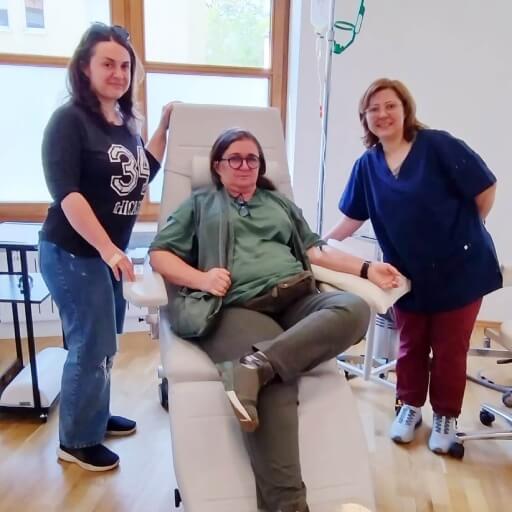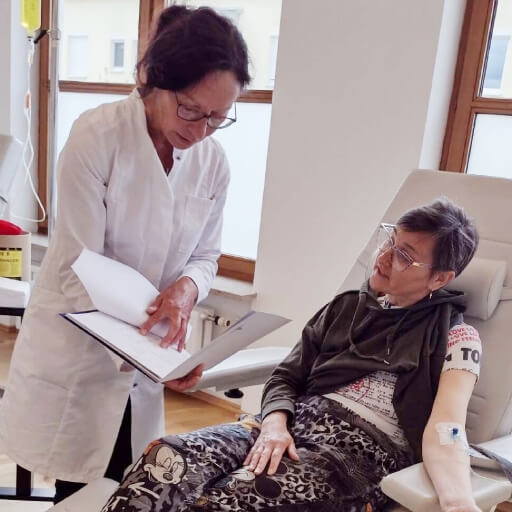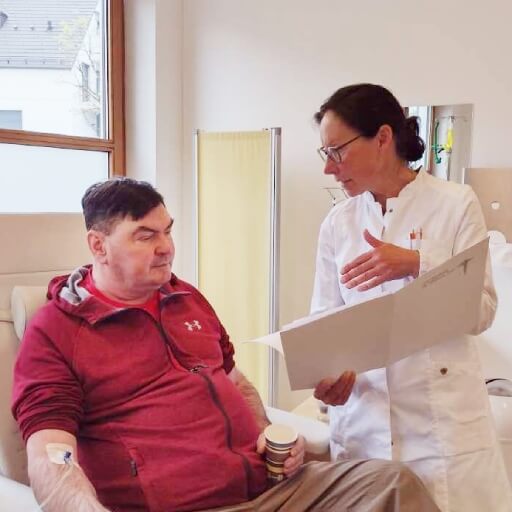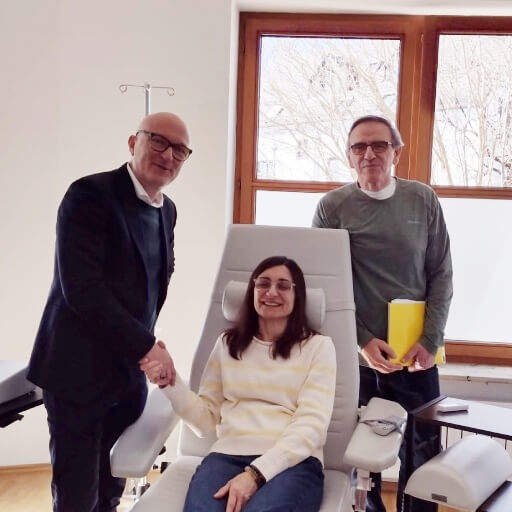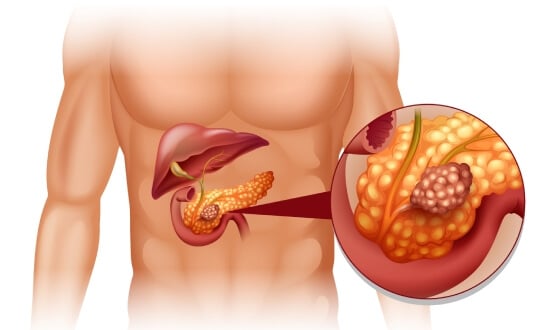سرطان البنكرياس هو مرض خطير ذو مسار سريري شديد وتوقعات سلبية عادةً. من المعروف أن معدلات البقاء على قيد الحياة لمدة 5 سنوات هي من أدنى المعدلات، حوالي 7٪. يتم تشخيص غالبية المرضى في مراحل متقدمة ويموتون خلال عام واحد بعد التشخيص.
تُعد المرحلة الرابعة من سرطان البنكرياس صعبة الإدارة للغاية بسبب السمات المحددة للورم والمقاومة الكيميائية. نتيجة لذلك، نادراً ما تتجاوز معدلات البقاء على قيد الحياة لمدة خمس سنوات في هذه المرحلة 5٪. يؤكد هذا على الحاجة إلى أساليب علاج جديدة، الأمر الذي أدى إلى إجراء أبحاث مكثفة وتنفيذ علاجات متقدمة في الممارسة السريرية. يُقدم هذا الدليل مراجعة شاملة لطرق العلاج التقليدية والعلاجات المبتكرة لإدارة المرحلة الرابعة من سرطان البنكرياس.
العلاج التقليدي لسرطان البنكرياس النقيلي (mPC)
يُعد علاج المرحلة الرابعة من سرطان البنكرياس صعباً للغاية بسبب طبيعة الأنسجة الخبيثة نفسها لأنها تُحفز نمو أنسجة ليفية محددة. هذه المصفوفة الليفية "تخدع" جهاز المناعة الخاص بالمريض، ولا تسمح بنفاذ الأدوية بسهولة. علاوةً على ذلك، في هذه المرحلة، تكون الخلايا الخبيثة قد انتشرت بالفعل إلى أعضاء بعيدة أخرى، مما يستثني عادةً الاستئصال الجراحي للورم. بالتالي، يُعد العلاج الكيميائي الخيار الأول لـ علاج المرحلة الرابعة من سرطان البنكرياس. يمكن استخدام كلا من العلاج الأحادي والعلاج المُركَّب في هذه المرحلة، مع التركيبة نفسها اعتماداً على حالة أداء ECOG للمريض (السُمية ومعايير الاستجابة للمجموعة التعاونية الشرقية لطب الأورام) ومستويات البيليروبين.
يوصى بشدة بإجراء الاختبارات الجزيئية والجينية لأنها تسمح بـ خيارات العلاج للمرحلة الرابعة من سرطان البنكرياس الإضافية، مثل العلاج الكيميائي الإشعاعي للمرضى الإيجابيين لـ BRCA1/2 أو PALB2. في هذه المرحلة، يُصبح العلاج التلطيفي وإدارة الألم من الأولويات إلى جانب العلاجات الجهازية. المرضى الذين يعانون من انسداد الاثنى عشر أو القناة الصفراوية قد يستفيدون من تركيب الدعامات. ومع ذلك، لا توفر أي من هذه الأساليب فوائد كبيرة للبقاء على قيد الحياة أو تحسينات كبيرة في الحياة اليومية المرغوبة. لذلك، هناك حاجة مُلحة لـ علاجات جديدة لسرطان البنكرياس في المرحلة الرابعة.
طرق جديدة لإدارة المرحلة الرابعة من سرطان البنكرياس
إن الحاجة إلى علاجات مبتكرة للمرحلة الرابعة من سرطان البنكرياس واضحة، وهذا هو السبب في أن العديد من الأساليب الجديدة تكتسب زخماً. تتمثل العلاجات الحديثة لسرطان البنكرياس الآن في إجراءات طفيفة التوغل، مثل الانصمام الكيميائي عبر الشرايين، والاجتثاث، والعلاج بالخلايا المتغصنة، وفرط الحرارة.
الاجتثاث عن طريق الجلد في المرحلة الرابعة من سرطان البنكرياس
تقنيات الاجتثاث الحراري، تزداد أهمية وتحديداً الاجتثاث بالترددات الراديوية (RFA) والاجتثاث بالميكروويف (MWA)، كعلاجات مساعدة لـ علاج المرحلة الرابعة من سرطان البنكرياس. تستخدم كلتا الطريقتين درجات حرارة عالية لاستهداف وتدمير أنسجة الورم بدقة، مما يفتح آفاقاً جديدة للمرضى غير المرشحين للجراحة.
الاجتثاث بالترددات الراديوية هو تقنية طفيفة التوغل، تعمل على توصيل طاقة حرارية كهربائية إلى موقع الورم. عند إدخالها في الورم، تُسبب الأقطاب الكهربائية نخراً موضعياً في الأنسجة، وبالتالي انخفاضاً في كتلة الورم. على الرغم من أن RFA ليس خياراً قياسياً في المبادئ التوجيهية للأورام السريرية، إلا أن هذا الإجراء أظهر نتائج مُشجعة في علاج المرحلة 4 من سرطان البنكرياس. تُشير الدراسات إلى تراجع ملحوظ في نمو الورم بنسبة تصل إلى 80٪ لدى مرضى سرطان البنكرياس غير القابل للاستئصال. بالإضافة إلى ذلك، أثبت RFA أنه يُزيد من معدلات البقاء على قيد الحياة بشكلٍ عام، خاصةً عند اقترانه بالعلاج الجهازي القياسي. نظراً لأنه يتم تحمله جيداً من قبل المرضى وله ملف أمان جيد، فإن RFA هو الخيار المفضل لعلاج الأورام غير القابلة للاستئصال.
الاجتثاث بالميكروويف هو طريقة أخرى للاجتثاث الحراري، والتي يتم استخدامها بشكل متزايد في علاجات المرحلة الرابعة من سرطان البنكرياس. تُشير دراسات استباقية حديثة إلى سيطرة إشعاعية على الورم ومعدلات استجابة موضعية تتراوح بين 60٪ و 75٪ خلال فترة تتراوح بين 6 و 12 شهراً من العلاج. بالإضافة إلى قمع الورم، أثبت MWA أنه أداة لا غنى عنها للإدارة التلطيفية للأعراض، مثل آلام البطن المستعصية. لذلك، قد يقترح MWA تأثير إيجابي على جودة الحياة.
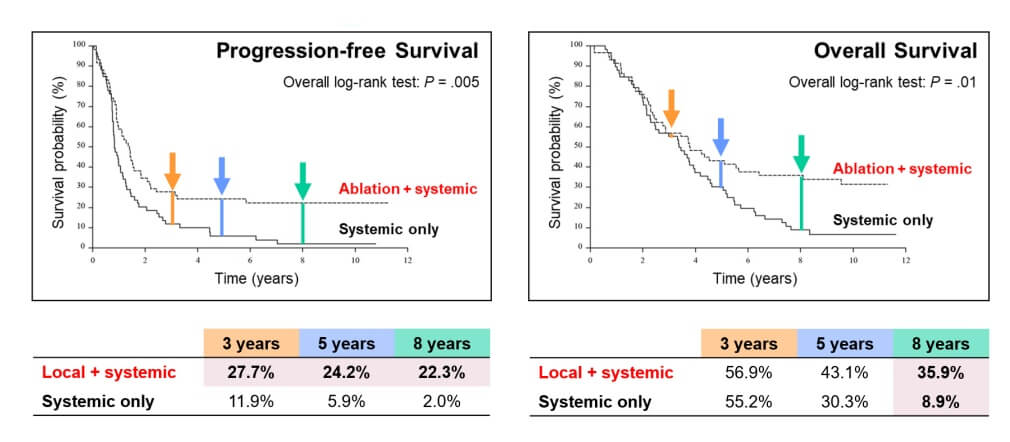
الاجتثاث بالتبريد هو طريقة بديلة تستخدم البرودة الشديدة لتحفيز نخر الورم عن طريق تكوين جليد داخل الخلايا. اكتسب أيضاً زخماً بين خيارات علاج المرحلة 4 من سرطان البنكرياس، وخاصةً بالنسبة للأورام الموجودة بالقرب من الهياكل التشريحية الحرجة، مثل الوريد البابي. إن قدرته على حفظ الأنسجة المحيطة تجعله ذا قيمة لا تُقدر بثمن في المناطق التشريحية المعقدة. البيانات الحديثة تقترح أن معدل البقاء على قيد الحياة الخالي من تَقدُم المرض يبلغ حوالي 66٪ بعد ستة أشهر لمرضى سرطان البنكرياس غير القابل للاستئصال بعد الاجتثاث بالتبريد. علاوةً على ذلك، يتم استخدام الاجتثاث بالتبريد بفعالية في حالات مختارة من السرطان الغدي البنكرياسي القنوي النقيلي، خاصةً عندما يكون التدخل الجراحي ممنوعاً. يُعد الاجتثاث بالتبريد جيداً بشكلٍ عام، ويُظهر نسبة منخفضة من المضاعفات، مثل الألم أو عسر الهضم بعد العملية.
العلاج الكيميائي الكهربائي (ECT) لسرطان البنكرياس في المرحلة الرابعة
التثقيب الكهربائي المعكوس Reversible electroporation - وهو أساس العلاج الكيميائي الكهربائي Electrochemotherapy - يُحدث نقلة نوعية في طريقة اختراق الأدوية للخلايا السرطانية. فالنَبضات الكهربائية القصيرة تُحدِث مَساماً مؤقتة في أغشية الخلايا، مما يسمح بتدفق عوامل العلاج الكيميائي إلى داخل الخلايا بتركيزات لا يمكن تحقيقها بالطرق التقليدية. ويمثل هذا إنجازاً بالغ الأهمية بالنسبة لأورام البنكرياس في المرحلة الرابعة، المعروفة بمقاومتها الشديدة للعلاج.
تكشف البيانات السريرية عن نتائج مُبهرة. فقد أظهرت التجارب السريرية المبكرة معدلات استجابة تصل إلى 65٪ في حالات أورام البنكرياس الخبيثة المتكررة – لا سيما تلك التي تتسم بتورط وعائي كبير. تُظهر خبرة البروفيسور أيغنر الواسعة نتائج أكثر إثارة للإعجاب: حيث تم تحقيق انخفاض في حجم الورم بنسبة 80٪ في غضون أيام قليلة في بعض الحالات. تُثبت هذه التقنية فعاليتها بشكلٍ خاص عندما تغزو الأورام الأنسجة المحيطة، ما يجعل الاستئصال الجراحي مستحيلاً. [4]
يتضمن الإجراء وضع أقطاب كهربائية بدقة حول محيط الورم تحت التخدير العام. فالمسافة بين الإبر، التي تتراوح بين 2.5 و 3 سنتيمترات، تُنشئ مجالات كهربائية متداخلة، بينما تقوم أنظمة الكمبيوتر بتنسيق توصيل النبضات مع إيقاع القلب – مما يمنع أي تداخل مع وظيفة القلب. عادةً ما يتطلب العلاج جلستين يفصل بينهما ثلاثة أسابيع، مع إجراء تقييم تصويري بين الجلستين.
ما الذي يُميّز العلاج الكيميائي الكهربائي ECT؟ بالإضافة إلى تأثيراته السامة المباشرة على الخلايا السرطانية، تُحفّز النبضات الكهربائية موتاً خلوياً مناعياً – وهذا يؤدي إلى إطلاق مستضدات الورم وتنشيط جهاز المناعة. تُوفّر هذه الآلية المزدوجة مزايا كبيرة عند دمجها مع بروتوكولات العلاج المناعي، وهو أمر بالغ الأهمية في حالات المرض النقيلي حيث يكون تنشيط الجهاز المناعي الجهازي ذا أهمية قصوى.
ينبغي على المرضى إدراك أن تكلفة العلاج الكيميائي الكهربائي Electrochemotherapy تختلف اختلافاً كبيراً حسب المؤسسة الطبية والموقع الجغرافي. عند تقييم تكلفة العلاج الكيميائي الكهربائي، يجب الأخذ في الاعتبار أن العلاج الكيميائي الكهربائي Electro-chemotherapy قد يحقق السيطرة على الورم في الحالات المقاومة للعلاج الكيميائي – مما قد يُسهم في تقليل إجمالي نفقات العلاج والحفاظ على جودة الحياة.
شرح العلاج الكيميائي الكهربائي: لماذا يُحدث هذا "الوافد الجديد" تغييراً جذرياً في علاج السرطان
الانصمام الكيميائي عبر الشرايين (TACE) في المرحلة الرابعة من سرطان البنكرياس
الانصمام الكيميائي عبر الشرايين، أو TACE، طريقة علاج مبتكرة تجعل من الممكن توصيل العوامل العلاجية الكيميائية بشكل موجه مع قطع إمدادات الدم للورم في نفس الوقت لتعزيز التأثير العلاجي. بالنسبة للمرحلة الرابعة من سرطان البنكرياس، يُعتبر TACE خيار علاج مساعد وتلطيفي. فوق كل ذلك، فهو أفضل علاج لسرطان البنكرياس في المرحلة الرابعة، وهو فعال بشكلٍ خاص لأولئك الذين يعانون من نقائل الكبد. الدراسات التي أُجريت باستخدام حبيبات مُطلقة للدواء، والتي تعمل على توسيع نطاق إطلاق العوامل العلاجية الكيميائية بشكل موضعي في أنسجة الورم، أظهرت أن TACE يُحسّن السيطرة الموضعية على المرض بنسبة تصل إلى 70٪. بالإضافة إلى ذلك، يتم تمديد الوقت الخالي من التَقدُم لمدة تصل إلى 12 شهراً. ومن المعروف أن TACE يوفر فائدة البقاء على قيد الحياة، حيث يعيش أكثر من 80٪ من المرضى لأكثر من عام واحد. يُجنّب تقديم العلاج الكيميائي الإقليمي التعرض الجهازي والسُمية العالية، وهو أمر بالغ الأهمية للمرضى الضعفاء. إذا كنت مُتشوق لمعرفة المزيد عن هذا الإجراء المبتكر، بما في ذلك كيفية إجرائه، وما هى موانع استخدامه، وما يمكن توقعه بعده، يُرجى مشاهدة المقابلة مع البروفيسور أتيلا كوفاتش.
البروفيسور كوفاتش: متى يتم استخدام DEB-TACE أو TACE التقليدي أو الانصمام الإشعاعي (TARE)
العلاج الكيميائي الإقليمي في علاج سرطان البنكرياس المتقدم
يتطلب سرطان البنكرياس المتقدم حلولاً جذرية. فعندما تنتشر الأورام إلى ما يتجاوز إمكانيات الاستئصال الجراحي – كما في دراسة البروفيسور أيغنر الشاملة التي شملت 280 مريضاً مصاباً بالمرحلة الرابعة من المرض – يوفر العلاج الكيميائي الإقليمي Regional chemotherapy بارقة أمل حيث تفشل الأساليب التقليدية. [4]
العلاج الكيميائي الإقليمي للمرحلة الرابعة من سرطان البنكرياس يتجاوز العائق الأساسي للعلاج الجهازي: تخفيف تركيز الدواء. فالعلاج الكيميائي التقليدي يوزّع الأدوية عبر 5-7 لترات من الدم قبل وصوله إلى الورم. أما الإيصال الإقليمي فيُحقق عكس ذلك تماماً – إذ يصل تركيز الدواء إلى 60.000 نانوغرام/مل مباشرةً في موضع السرطان، مع الحفاظ على مستوى منخفض للغاية من التعرض الجهازي.
يوجد نهجان لعلاج الحالات المتقدمة. يُمثل الحقن بالتسريب داخل الشريان عبر قسطرة المحور البطني الأسلوب الأساسي، حيث يتم إيصال الأدوية المركزة عبر قسطرة موضوعة بدقة على مدى أربعة أيام متتالية. أما النهج الأكثر كثافة، وهي التروية المعزولة للجزء العلوي من البطن مع الترشيح الكيميائي (UAP-F)، فتذهب إلى ما هو أبعد من ذلك – إذ تقوم القسطرات البالونية بعزل الجزء العلوي من البطن بالكامل بشكلٍ مؤقت، مما يُنشِئ دائرة مغلقة تصل فيها الأدوية إلى أقصى فعالية ممكنة قبل أن تتم إزالة ما تبقى منها عن طريق تقنية ترشيح الدم لمدة 45 دقيقة.
نتائج المرحلة الرابعة باستخدام هذا العلاج المبتكر للمرحلة الرابعة من سرطان البنكرياس تُشير إلى نتائج باهرة. فقد حقق المرضى الذين تلقوا التروية المعزولة للجزء العلوي من البطن مع الترشيح الكيميائي UAP-F متوسط بقاء على قيد الحياة قدره 8.7 أشهر مقابل 6.6 أشهر مع التسريب الشرياني التقليدي. وماذا عن معدل البقاء على قيد الحياة لمدة عام؟ بلغ 37٪ مع UAP-F مقارنةً بـ 20.3٪ فقط مع التوصيل الإقليمي التقليدي. وحتى بعد ثلاث سنوات، ظل 7.7٪ من المرضى الذين عُولِجوا بـ UAP-F على قيد الحياة. كما ساهمت هذه التقنية في حل مشكلة الاستسقاء البطني الحاد في 33 حالة من أصل 36 – موفرةً راحة فورية من الأعراض إلى جانب الفوائد المتعلقة بالبقاء على قيد الحياة. [4]
ظلت السُمية ضئيلة جداً طوال فترة العلاج، حيث اقتصرت في الغالب على الدرجة I-II حسب تصنيف منظمة الصحة العالمية (WHO)، ولم تظهر آثار جانبية خطيرة إلا لدى المرضى الذين خضعوا لعلاجات مكثفة سابقاً. يناقش البروفيسور أيغنر خبرته الرائدة مع هذه التقنيات في المقابلة التالية.
التطعيم بالخلايا المتغصنة للمرحلة الرابعة من سرطان البنكرياس
العلاج بالخلايا المتغصنة يُمثل تقدماً متطوراً في مجال العلاج المناعي. وفقاً لبعض التقارير، فهو أفضل علاج للمرحلة الرابعة من سرطان البنكرياس. العلاج بالخلايا المتغصنة هو شكل من أشكال العلاج المُخصص، يُسخّر آليات الدفاع المناعي للجسم من خلال الخلايا المتغصنة. باعتبارها "كشافة" مناعية، تعمل الخلايا المتغصنة على اكتشاف الخلايا غير الطبيعية وتنظيم تنشيط الخلايا القاتلة المناعية من خلال التعرف على الخلايا غير الطبيعية وتقديمها لها.
العلاج بالخلايا المتغصنة يكتسب زخماً متزايداً في علاج المرحلة 4 من سرطان البنكرياس. تقترح البيانات السريرية أن هذا العلاج يُسهم في استقرار حالة المرض لدى ما يصل إلى 50٪ من المرضى، إلى جانب تحسينات ملحوظة في إدارة الأعراض، بما في ذلك تقليل التعب، وتحسين الشهية، وتخفيف الألم. العلاج بالخلايا المتغصنة يتمتع بملف أمان إيجابي مع آثار جانبية قليلة أو معدومة، مما يجعله خياراً مفضلاً للمرضى المسنين أو أولئك الذين أضعفتهم العلاجات السابقة. بالإضافة إلى ذلك، تُشير الدراسات المبكرة إلى أن لقاحات الخلايا المتغصنة يمكن أن تمنح فائدة البقاء على قيد الحياة لمدة تتراوح بين عدة أشهر إلى أكثر من عام عند دمجها مع وسائل علاجية أخرى، مثل العلاج الكيميائي أو تقنيات الاجتثاث.
تتضمن هذه التقنية ما يلي:
- الحصول على الخلايا المتغصنة من المريض
- إنضاجها في ظروف معملية تحت تأثير عناصر غذائية متنوعة
- تقديمها للمستضدات المرتبطة بالورم
- إعادة إدخالها إلى مجرى دم المريض
بمجرد دخولها الجسم، تبدأ هذه الخلايا المُعاد برمجتها استجابة مناعية ضد خلايا البنكرياس الخبيثة. العلاج بالخلايا المتغصنة، الحائز على جائزة نوبل في علم وظائف الأعضاء أو الطب لعام 2011، فتح آفاقاً جديدة في علاج الأورام التي تُعتبر غير مُستجيبة للعلاجات التقليدية. للحصول على فهم أعمق لكيفية تحويل العلاج بالخلايا المتغصنة علاج المرحلة الرابعة من سرطان البنكرياس، يُرجى مشاهدة مقابلة مناقشة مع البروفيسور فرانك جانسوج، الخبير الرائد في العلاج المناعي في ألمانيا. في هذه المقابلة، يشرح الأسس العلمية وراء العلاج بالخلايا المتغصنة ويشارك بيانات مباشرة عن نتائج العلاج والإجراء العام للعلاج بالخلايا المتغصنة.
رؤى الخبراء من البروفيسور جانسوج: قوة العلاج بالخلايا المتغصنة في علاج السرطان
فرط الحرارة في المرحلة الرابعة من سرطان البنكرياس
فرط الحرارة يُعد جزءاً من علاج سرطان البنكرياس التكاملي، والذي كان يُعرف سابقاً كعلاج داعم لتخفيف الأعراض. ومع ذلك، يتم إعادة اكتشافه حالياً كأداة قيمة لعلاج المرحلة الرابعة من سرطان البنكرياس. يعمل فرط الحرارة عن طريق رفع درجة حرارة الأنسجة، مما يؤدي إلى تعطيل المسارات التنظيمية الموضعية بعيداً عن التأثير المباشر للسُمية الخلوية. نتيجة لذلك، قد يتم حرمان الخلايا الخبيثة من العناصر الغذائية التي تحصل عليها من مجرى الدم وتتحلل.
سرطان البنكرياس، بما في ذلك سرطان البنكرياس الغدي، من المعروف أنه يطور مصفوفة ليفية خاصة تحمي الورم وتحافظ على بيئته الميكروية المحيطة. ومع ذلك، أظهرت الأبحاث الحديثة أن فرط الحرارة المغناطيسي (الحرارة المتولدة بواسطة الجسيمات النانوية المغناطيسية في مجال كهربائي) يمكن أن يؤدي إلى تقليص حجم الورم وتحفيز موت الخلايا المُبرمج. بالإضافة إلى ذلك، يعمل فرط الحرارة الخفيف على تعطيل غشاء خلية الورم، مما يُعزز نفاذية الورم وحساسيته للعلاج الجهازي. كما يمكن لفرط الحرارة الخفيف، خاصةً عند تحفيزه بالعلاج الضوئي الحراري، أن يُنشّط استجابة مناعية تهدف إلى تعطيل البيئة الميكروية المحيطة بالورم مما يجعل المرحلة 4 من سرطان البنكرياس أكثر عُرضة للعلاج المناعي.
باختصار: علاجات المرحلة الرابعة من سرطان البنكرياس بالأرقام
لا تتردد في الاطلاع على الجداول المُقارنة أدناه لمقارنة العلاجات المختلفة.
| الخصائص/نوع العلاج | معدل البقاء على قيد الحياة لمدة عامين | معدل الاستجابة | المدة | الآثار الجانبية |
|---|---|---|---|---|
| العلاج القياسي | ~٪25 للسرطان المتقدم | أقل من 10٪ | عدة دورات | شديدة (غثيان، وتعب، وتساقط الشعر، وكبت المناعة، وتهيُج الجلد) |
| الأساليب المبتكرة | ~٪60 للسرطان المتقدم | ٪65-45 | ما يصل إلى 4 جلسات | خفيفة (شعور موضعي بعدم الارتياح) |
* بيانات Booking Health
جدول مُقارن لأسعار أساليب العلاج القياسية والمبتكرة في ألمانيا، وبريطانيا العظمى، والولايات المتحدة الأمريكية
| طريقة العلاج | ألمانيا* | بريطانيا العظمى | الولايات المتحدة الأمريكية |
|---|---|---|---|
| العلاج القياسي | 80.000 € - 150.000 € دورة كاملة | 90.000 € - 165.000 € دورة كاملة | 100.000 € - 180.000 € دورة كاملة |
| الأساليب المبتكرة | 25.000 € - 60.000 € دورة كاملة | 70.000 € - 120.000 € دورة كاملة | 100.000 € - 150.000 € دورة كاملة |
* التكاليف التقديرية تقريبية وقد تختلف اعتماداً على البلد، والمرفق الطبي، وبروتوكول العلاج، وعدد الجلسات، واحتياجات المريض الفردية.
ليس حُكماً: كيف يساعد العلاج بالخلايا المتغصنة في مكافحة سرطان البنكرياس
في أوائل عام 2024، واجه روبرت فرانكلين سميث من الولايات المتحدة تشخيصاً مدمراً: سرطان البنكرياس مع نقائل الكبد. باعتباره زوجاً وأباً مخلصاً، فقد أدرك أن الوقت كان يعمل ضده وضد أسرته. بدأوا فوراً بتطبيق بروتوكول العلاج القياسي. بعد خضوعه لجراحة الكبد وبدء جولات العلاج الكيميائي، عزمت عائلة سميث على بذل كل جهد ممكن في بحثهم عن أحدث العلاجات المتاحة.
على الرغم من بذل أطبائه أفضل جهد، شعرت العائلة أن حالتها قد وصلت إلى مرحلة مستقرة. لكن، انفتح طريق جديد خلال هذه الفترة عندما بدأت زوجة روبرت البحث عن العلاج في الخارج، وعثرت على العلاج بالخلايا المتغصنة في ألمانيا. قادهم هذا البحث إلى شركة Booking Health، وهي شركة سياحة علاجية مشهورة بخبرتها في تنظيم العلاج في الخارج.
منذ الاستفسار الأول، قدّمت شركة Booking Health أكثر من مجرد دعم لوجستي. قاموا بتوفير الوضوح، والتعاطف، والشعور بالأمل. "لقد تولوا كل شيء: الإقامة، والمترجمون، والانتقالات، والوثائق الطبية. "اهتموا بكل التفاصيل حتى نتمكن من التركيز على ما هو أهم: صحة روبرت،" تتذكر السيدة سميث قائلة. كان هدفهم هو علاج المرحلة الرابعة من سرطان البنكرياس في ألمانيا، وتحديداً في مختبرات LDG في بيرج. إنه مركز طبي يديره الدكتور جانسوج، وهو متخصص مشهور عالمياً في العلاج المناعي. العلاج بالخلايا المتغصنة، هو علاج متطور لم يكن متاحاً بعد في الولايات المتحدة، وكان متاحاً في ألمانيا. لذا اغتنم روبرت هذه الفرصة وخضع للعلاج. هذا الإجراء، المُصمّم لتحفيز جهاز المناعة للتعرّف على خلايا السرطان لدى المريض ومهاجمتها، منحَ العائلة شعوراً جديداً بالسيطرة.
"ما لفت الانتباه لم يكن مستوى الرعاية فحسب، بل أيضاً التواصل الإنساني،" قالت السيدة سميث. "جمع الدكتور جانسوج بين الخبرة العميقة، والدفء الحقيقي، والفكاهة. لقد منحنا القوة في الوقت الذي كنا في أمس الحاجة إليها." كأداة تكميلية قيمة للعلاج البروتوكولي، قدم العلاج بالخلايا المتغصنة الأمل وأعاد الحياة التي كان روبرت وعائلته يبحثون عنها. مَنحه ذلك شعوراً بالسيطرة من خلال الحد من تكرار المرض واستقرار مساره. بفضل تحمّله الممتاز وآثاره الضارة التي تكاد تكون صفر تقريباً، مكّن العلاج بالخلايا المتغصنة روبرت سميث من اكتساب قوة إضافية بعد استنفاد العلاج الكيميائي، بل وحتى إعادة بناء صحته.
اليوم، بينما يواصل روبرت رحلة علاجه، تتحدث أسرة سميث بصراحة عن نقطة التحول التي شهدوها في ألمانيا. إن التصميم، والمثابرة، والانفتاح على الابتكارات مهدت الطريق لبداية جديدة، حتى في الحالات المتقدمة من سرطان البنكرياس.
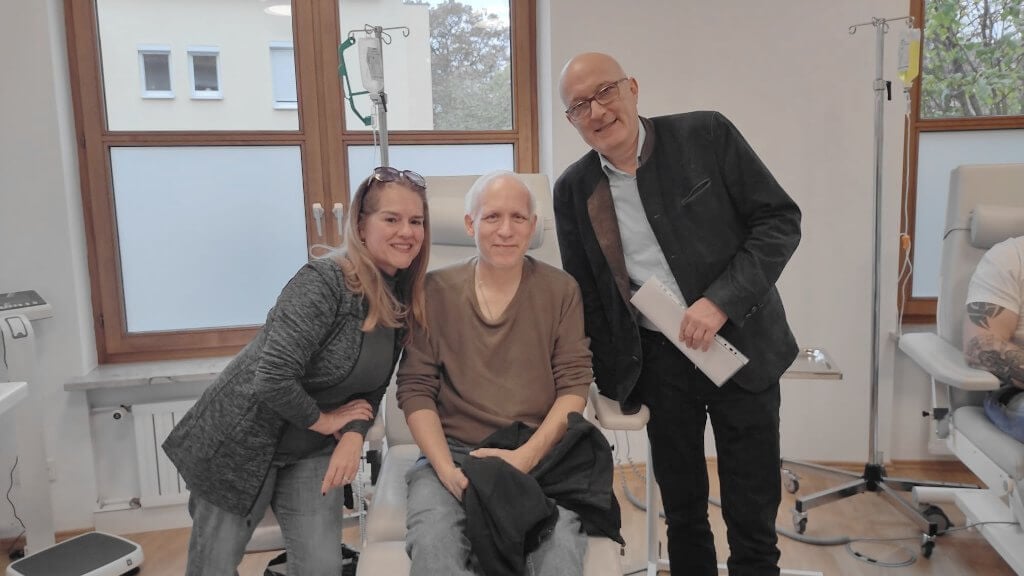
أمل في مواجهة سرطان البنكرياس المتقدم: نهج جديد
يعتقد الكثيرون أن تشخيص الإصابة بالمرحلة 4 من سرطان البنكرياس هو بمثابة "نهاية الطريق". غالباَ ما تُقدم العلاجات القياسية نتائج محدودة مع معدلات منخفضة للبقاء على قيد الحياة وغالباً ما تكون على حساب جودة الحياة. بالنسبة للعديد من المرضى، تُعد نقائل سرطان البنكرياس مرادفاً لتوقعات قاتمة وأملٍ متضائل. ومع ذلك، لا ينبغي أن يظل هذا الوضع دون تحدي. هناك مجموعة متزايدة من الأدلة والتجارب الواقعية التي تقترح أنه حتى في المراحل الأكثر تقدماً من السرطان، توجد خيارات قابلة للتطبيق ومتطورة تستحق الاستكشاف.
في جميع أنحاء العالم، تقوم الدول باستثمارات كبيرة في الأبحاث الطبية المتقدمة وتطوير أدوات علاجية مبتكرة. أحد التطورات الأكثر وعداً في إدارة المرحلة النهائية من سرطان البنكرياس هو تبني نهج شخصي ومتكامل. يتضمن ذلك تصميم علاجات تتناسب مع الحالة السريرية الفريدة للمريض من خلال الجمع بين العلاجات المناعية الجديدة، والعلاجات الموجهة بدقة، وتقنيات التصوير المتقدمة، والإجراءات طفيفة التوغل. لا تهدف هذه الاستراتيجيات إلى إطالة البقاء على قيد الحياة بشكلٍ عام فحسب، بل تهدف أيضاً إلى تحسين جودة الحياة أثناء العلاج. رغم أن الهدأة التامة من المرض قد تظل بعيدة المنال، فإن الاستراتيجيات الجديدة قد توفر أداءً يومياً أفضل.
هناك مجموعة متزايدة من الأدلة والخبرة في العالم الحقيقي تقترح أنه حتى في المراحل الأكثر تَقدُماً من السرطان، هناك خيارات قابلة للتطبيق تستحق الاستكشاف. في أيدي المتخصصين ذوي الخبرة في طب الأورام، يمكن للخطط العلاجية الحديثة متعددة الوسائط أن تعمل على استقرار تَقدُم المرض بل وحتى استعادة جزء من روتينك اليومي السابق. إن طلب الرعاية في المراكز الطبية الدولية التي تتمتع بسمعة طيبة في مجال الابتكارات الطبية الرائدة يمكن أن يفتح آفاقاً قد لا تتضمنها البروتوكولات القياسية. سواءً من خلال تجارب سريرية، أو الوصول إلى علاجات مدعومة بالأدلة، أو أساليب متعددة التخصصات، غالباً ما يكتشف المرضى خيارات تمنحهم سيطرة متجددة على رحلة علاجهم.
اتخاذ الخطوة الأولى لاستكشاف آراء أخرى، والبحث في المراكز الطبية في الخارج، والانفتاح على العلاجات الجديدة يمكن أن يكون نقطة تحول حاسمة. في كثير من الحالات، ما يبدو باباً مغلقاً في الوطن قد يكون بوابة مفتوحة في الخارج. بالنسبة لأولئك الذين يكافحون سرطان البنكرياس المتقدم، فإن المثابرة والأمل هما المفتاح. رغم أن العلاج العالمي قد لا يكون موجوداً حتى الآن، فإن أولئك الراغبين في البحث عنه يمكنهم إيجاد طرق ذات معنى لإطالة الحياة، واستقرار المرض، وتحسين الصحة.
رحلة طبية: كل خطوة على الطريق مع Booking Health
يُعد إيجاد أفضل استراتيجية علاج لحالتك السريرية مهمةً صعبة. بعد الخضوع لجلسات علاج متعددة، واستشارة العديد من المتخصصين، وتجربة مختلف التدخلات العلاجية، قد تجد نفسك في حيرة من أمرك بسبب المعلومات التي يقدمها الأطباء لك. في مثل هذه الحالة، من السهل اختيار خيار مباشر أو اتباع بروتوكولات علاجية موحدة ذات قائمة طويلة من الآثار الضارة بدلاً من اختيار خيارات علاج مبتكرة ومتخصصة للغاية.
لاتخاذ قرار مستنير والحصول على خطة مُخصصة إدارة السرطان، والتي سيتم تصميمها لتناسب حالتك السريرية المحددة، استشر الخبراء الطبيين في Booking Health. نظراً لكونها في الطليعة في تقديم أحدث الابتكارات الطبية لـ 12 عاماً بالفعل، تتمتع شركة Booking Health بخبرة قوية في إنشاء برامج إدارة السرطان المعقدة لكل حالة. كشركة مرموقة، تُقدم Booking Health خطط علاج مُخصصة للمرحلة الرابعة من سرطان البنكرياس، مع حجز مباشر للمستشفى، ودعم كامل في كل مرحلة، بدءاً من العمليات التنظيمية ووصولاً إلى المساعدة أثناء العلاج. نحن نُقدم:
- تقييم وتحليل التقارير الطبية
- تطوير برنامج الرعاية الطبية
- اختيار موقع العلاج المناسب
- إعداد الوثائق الطبية وإرسالها إلى مستشفى مناسب
- الاستشارات التحضيرية مع الأطباء لتطوير برامج الرعاية الطبية
- نصائح الخبراء أثناء الإقامة في المستشفى
- رعاية متابعة بعد عودة المريض إلى بلده الأصلي بعد إكمال برنامج الرعاية الطبية
- الاهتمام بالإجراءات الرسمية كجزء من التحضير لبرنامج الرعاية الطبية
- تنسيق وتنظيم إقامة المريض في بلد أجنبي
- المساعدة في الحصول على التأشيرات وتذاكر الطيران
- مُنسق شخصي ومترجم فوري مع دعم على مدار 24/7
- الميزانية الشفافة دون تكاليف خفية
الصحة جانبٌ لا يُقدّر بثمن في حياتنا. ينبغي تفويض إدارة شيء هش وثمين فقط إلى خبراء يتمتعون بخبرة مُثبتة وسمعة طيبة. Booking Health هي شريك جدير بالثقة يساعدك على طريق الحصول على صحة أقوى وجودة حياة أفضل. اتصل بمستشارنا الطبي لمعرفة المزيد عن إمكانيات العلاج الشخصي باستخدام الأساليب المبتكرة لسرطان البنكرياس النقيلي مع متخصصين رائدين في هذا المجال.
العلاج الحديث للسرطان: رحلات المرضى مع Booking Health
الأسئلة الشائعة حول المرحلة الرابعة من سرطان البنكرياس
أرسل طلب للعلاجسرطان البنكرياس المتقدم قد يُظهر أعراضاً مختلفة، بما في ذلك فقدان الوزن غير المُبرر، وتغيرات في الشهية، والشعور بعدم الارتياح في البطن. يمكن أن يكون الكشف المبكر صعباً لأن الأعراض غالباً ما تظهر تدريجياً.
التشخيص يشمل فحصاً طبياً شاملاً وإجراءات تحديد المرحلة، بما في ذلك فحوصات التصوير (التصوير المقطعي المحوسب CT، والتصوير بالرنين المغناطيسي MRI) والخزعة.
أفضل علاج للمرحلة 4 من سرطان البنكرياس يشمل ما يلي:
- الأساليب المبتكرة: الانصمام الكيميائي، والعلاج المناعي، وتقنيات الأشعة التداخلية.
- الأساليب التقليدية: العلاج الكيميائي والعلاج الكيميائي الإشعاعي. يعتمد الاختيار على الحالات الفردية والحالة الصحية العامة.
على الرغم من أن المرحلة الرابعة من سرطان البنكرياس تُعتبر نقيلية، إلا أن طرق العلاج الحديثة تركز على إطالة متوسط العمر المتوقع وتحسين جودة الحياة. يواصل البحث تطوير إمكانيات العلاج.
يختلف متوسط العمر المتوقع بشكلٍ كبير بناءً على العوامل الفردية. أظهرت التطورات الطبية الحديثة، بما في ذلك العلاجات الموجهة، نتائج واعدة في إطالة معدلات البقاء على قيد الحياة بما يتجاوز التوقعات التقليدية.
على الرغم من أن الجراحة أقل شيوعاً في الحالات المتقدمة، إلا أن بعض المرضى قد يستفيدون من التدخلات الجراحية، خاصةً بعد الخضوع لعلاج مبتكر مثل الاجتثاث أو الانصمام الكيميائي.
تختلف تأثيرات العلاج باختلاف الأفراد. تشمل الآثار الجانبية الشائعة ما يلي:
- التعب،
- الغثيان والقيء،
- فقدان الشهية وعسر الهضم،
- اضطرابات الدم،
- الصداع المستمر والدوار.
تهدف الأساليب الحديثة إلى تقليل الشعور بعدم الارتياح مع تعظيم الفعالية من خلال خطط علاج شخصية.
في هذه المرحلة، قد ينتشر السرطان إلى أعضاء أخرى، وخاصةً الكبد. تستهدف استراتيجيات العلاج الورم الأساسي وأي مواقع نقيلية.
رغم أن الهدأة التامة أمر نادر، فقد أظهرت العلاجات المبتكرة نتائج واعدة في إدارة المرض وزيادة معدلات البقاء على قيد الحياة.
نعم، تواصل الأبحاث الجارية تطوير أساليب علاج جديدة. توفر المراكز الطبية الحديثة إمكانية الوصول إلى العلاجات المتقدمة والأساليب المبتكرة، بما في ذلك العلاج بالخلايا المتغصنة، والانصمام الكيميائي، والاجتثاث.
تُعد إدارة الألم جزءاً أساسياً من العلاج، باستخدام أساليب طبية وتداخلية متنوعة لضمان راحة المريض والحفاظ على جودة حياته.
تحسنت معدلات البقاء على قيد الحياة مع العلاجات الحديثة. في حين تُظهر الإحصاءات التقليدية معدلات أقل، فإن العلاجات المبتكرة تُظهر نتائج أكثر وعداً.
سرطان البنكرياس الغدي هو أكثر أنواع سرطان البنكرياس شيوعاً، وينشأ من الخلايا الإفرازية التي تُنتج الإنزيمات الهضمية. يميل هذا النوع إلى العدوانية، وينمو بسرعة، وغالباً ما يظهر في مرحلة متقدمة. من ناحية أخرى، تنشأ الأورام العصبية الصماوية البنكرياسية (PNETs) من خلايا البنكرياس المُنتجة للهرمونات. إنها نادرة جداً، وعادةً ما تنمو بشكل أبطأ، وقد تنتج هرمونات محددة تُسبب متلازمات سريرية مميزة.
نعم، يمكن أن يحدث انتشار نقيلي إلى أعضاء مختلفة، حيث يُعتبر الكبد الموقع النقيلي الأكثر شيوعاً. تستهدف استراتيجيات العلاج كلا من الورم الرئيسي والانتشار المحتمل إلى مناطق أخرى.
بالنسبة للمرحلة الرابعة من سرطان البنكرياس Pancreatic cancer، يبلغ معدل البقاء على قيد الحياة لمدة عامين مع العلاج الكيميائي القياسي حوالي 25٪. في المقابل، فإن الأساليب العلاجية المبتكرة (مثل العلاج بالخلايا المتغصنة Dendritic cell therapy أو TACE أو الاجتثاث Ablation) يمكن أن ترفع معدلات البقاء على قيد الحياة إلى حوالي 60٪.
ما هي معدلات الاستجابة التي لوحظت في المرحلة الرابعة من سرطان البنكرياس مع العلاجات القياسية والعلاجات المبتكرة؟
في المرحلة الرابعة من سرطان البنكرياس، عادةً ما توفر العلاجات القياسية معدل استجابة أقل من 10٪. في المقابل، فالأساليب العلاجية المبتكرة (مثل العلاج بالخلايا المتغصنة أو العلاج الكيميائي الكهربائي Electrochemotherapy أو TACE) يمكن أن تُحقق معدل استجابة يتراوح بين 45-65٪.
غالباً ما يتضمن العلاج القياسي للمرحلة الرابعة من سرطان البنكرياس عدة دورات من العلاج الكيميائي على مدى عدة أشهر. من ناحيةً أخرى، فإن الأساليب العلاجية المبتكرة (مثل TACE أو العلاج بالخلايا المتغصنة أو الاجتثاث) يتم إستكمالها عموماً في ما يصل إلى أربع جلسات.
غالباً ما يُسبب العلاج الكيميائي القياسي للمرحلة الرابعة من سرطان البنكرياس آثار جانبية شديدة مثل الغثيان، والتعب، وكبت المناعة. ومع ذلك، فإن العلاجات المبتكرة (مثل الاجتثاث بالتبريد أو TACE أو العلاج بالخلايا المتغصنة) عادةً ما تكون جيدة التحمُل، ولا تُسبب سوى شعور موضعي خفيف بعدم الارتياح مع تعافٍ أسرع.
يتم علاج المرحلة الرابعة من سرطان البنكرياس بهدف التسكين والتلطيف. يظل العلاج الجهازي هو الأساس بينما تُستخدم الأشعة التداخلية للسيطرة الموضعية على الورم (أو إدارة المضاعفات)؛ قد يتم اعتبار العلاج بالخلايا المتغصنة نهج مناعي مساعد؛ يمكن استخدام فرط الحرارة Hyperthermia لتعزيز الحساسية للعلاج.
الرعاية المُثلى تتطلب مراكز طبية ذات خبرة في إدارة سرطان البنكرياس المتقدم. يُفضل اختيار المستشفيات القادرة على دمج العلاج الجهازي مع الأشعة التداخلية، والعلاجات القائمة على المناعة، والإجراءات الداعمة – لأنها تسمح باتخاذ قرارات علاجية فردية (تتجاوز بروتوكولات العلاج الكيميائي القياسية).
غالباً ما يتم اختيار ألمانيا نظراً لتوافر استراتيجيات علاجية موسعة. يمكن للمرضى الوصول إلى تقنيات الأشعة التداخلية، والعلاج بالخلايا المتغصنة، وفرط الحرارة ضمن بيئات سريرية مُنظمة – مما يتيح اتباع أساليب شخصية لسرطان البنكرياس المتقدم (عندما تكون الخيارات القياسية محدودة).
اختر العلاج في الخارج وستحصل بالتأكيد على أفضل النتائج!
المؤلفون:
تم تحرير المقال من قبل خبراء طبيين وأطباء معتمدين من مجلس الأطباء الدكتورة ناديجدا إيفانيسوفا و الدكتور بوغدان ميخالنيوك. لعلاج الحالات المشار إليها في المقال، يجب استشارة الطبيب؛ المعلومات الواردة في المقالة ليست مخصصة للتطبيب الذاتي!
سياستنا التحريرية، التي توضح بالتفصيل التزامنا بالدقة والشفافية، متاحة هنا. انقر على هذا الرابط لمراجعة سياساتنا.
المصادر:
[4] Aigner, K.R., Gailhofer, S., Selak, E. et al. Intra-arterial infusion chemotherapy versus isolated upper abdominal perfusion for advanced pancreatic cancer: a retrospective cohort study on 454 patients. J Cancer Res Clin Oncol 145, 2855–2862 (2019). https://doi.org/10.1007/s00432-019-03019-6. [DOI]
اقرأ:
العلاجات الحديثة لسرطان البنكرياس
تقدم ألمانيا علاج مناعي قائم على الخلايا المتغصنة لسرطان البنكرياس
قائمة المقالات:
- العلاج التقليدي لسرطان البنكرياس النقيلي
- طرق جديدة لإدارة المرحلة الرابعة من سرطان البنكرياس
- باختصار: علاجات المرحلة الرابعة من سرطان البنكرياس بالأرقام
- ليس حُكماً: كيف يساعد العلاج بالخلايا المتغصنة في مكافحة سرطان البنكرياس
- أمل في مواجهة سرطان البنكرياس المتقدم: نهج جديد
- رحلة طبية: كل خطوة على الطريق مع Booking Health
- الأسئلة الشائعة حول المرحلة الرابعة من سرطان البنكرياس
لا تعرف من أين تبدأ؟
اتصل بـ Booking Health
